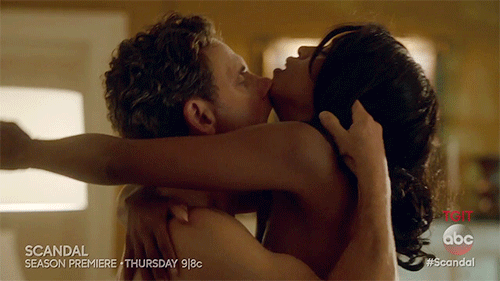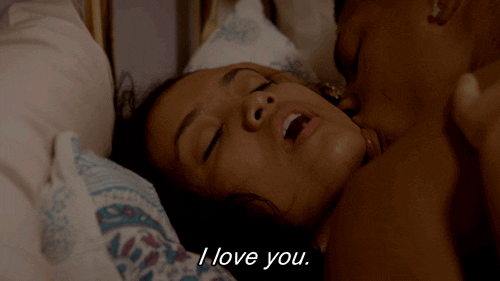
Because I’m not having sex, I haven’t given much thought to how sex after I deliver my little seed will be. Out of sight, out of mind, ya know? It wasn't until a friend randomly reached out to me, more excited for the postpartum sex that stood ahead of me than I knew to be possible. I was curious, to say the least. Where was this burst of energy for my postpartum sex life coming from? Apparently, she had just had mind-blowing sex with her man but this wasn’t the first time she mentioned this – she had once shared the exhilaration she felt during sex in a normal girl chat. But I wasn’t pregnant then so I hadn’t thought much of it.
However, this time around, my brain was most definitely activated. The one thing that stood out to me was the pleasure she seemed to derive from her postpartum sex life! Mostly, because this had been so unheard of. Perhaps it’s because I didn’t care to speak to my mother in-depth prior to my own little seed being implanted in me. Nevertheless, I had only ever heard of negative postpartum sex experiences. Women went from being the top-flight security, maintaining the secrecy of the motherhood journey, not speaking of anything but the joy of baby and baby alone to now, where we’ve seen a shift in women trying to sprinkle some realness in the mix – warning us of the potential woes of motherhood.
I mention this because motherhood has become saturated with changing the narrative to a more realistic one and, in turn, it can induce more fear than not knowing. It seems once we were released from the shackles of silence, it turned out that everyone was experiencing ass tears and postpartum depression, and if you’re a Black woman, you might not even live to tell about any of those experiences.
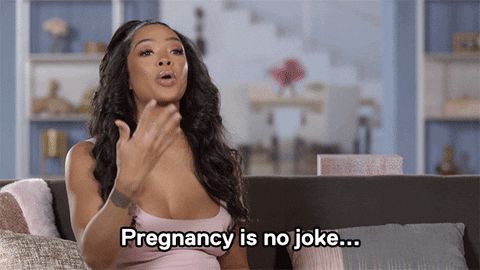
Giphy
I guess what I’m saying was it was refreshing to have someone share a positive about giving birth to a child – one that I most definitely value and one that skews the narrative to remind us that in all actuality: every experience is different! And in us trying to make up for the myths of motherhood being all peachy keen, we’ve forgotten what balance looks like – going from sunshine and roses to hellfire and misery.
As far as the sex component goes, we have truly only ever heard the bottom of the barrel! Men talking about how "loose" women allegedly are after having a child and TikTok highlighting the potential for what is known as a husband stitch, which ensures you go back to maximum tightness after tearing. (Also, unethical to perform without patient permission apparently).
Nevertheless, it made me curious to speak with other women about their postpartum sex experience and I was happy to find that there were more women out there who were experiencing good sex, and for various reasons! Here’s what 8 women had to say about postpartum sex.
Sex was different... in the best way possible.
"I have to say I didn't have the confidence or drive to have sex immediately after a vaginal birth (both times). But [around four to six] weeks after, sex for me was way better than before having a baby. It felt more intimate, more connected, and somewhat special to be having sex so soon after having a baby. Not many women talk about this, do they? But I don't think it's a big secret personally. Every woman has a different experience, and for me, it was good."
– Sophie
I'm more in tune with my body more than I've ever been.
“I'm a mom of two with my youngest being four months old. My postpartum sex experience has been amazing. I opted for a natural birth with a midwife and doula as a result my recovery was really quick. Since giving birth I've been really in tune with my body and been wowed at what a woman's body is able to do. I wouldn't describe myself as a very sexual person but since giving birth, my desire to have sex and my natural lubrication has increased tremendously.
"I've also been taking ashwagandha and maca root to support my breastfeeding journey. An added benefit [of taking them] was increased libido [and] not just around the ovulation period. My husband is very happy, to say the least.”
– Jasmine
Sex after delivery helped with my PPD.
“I have two young children under the age of eight years old and I could certainly say right away that postpartum sex is by far much much better than sex prior to having children for several reasons. Not only has perhaps my confidence elevated, but most importantly, it’s also much less tricky in terms of stimulation. In addition, it is much easier to switch positions and perform the act as there is rarely if ever any discomfort due to that tightness perhaps felt in the beginning. Sex after delivery was also very beneficial as I suffered from PPD for a couple of months after my first delivery. Sex in a way was perhaps a reward for that after waiting six weeks after giving birth.”
– Vanessa
It was the last piece of intimacy we had been missing.
"I had a C-section so I was told to wait at least six weeks before having sex. I feel like the wait time just added to the anticipation and excitement. The postpartum period is obviously crazy with a newborn and the lack of sleep for the first month or so (sex was the last thing on my mind). However, as the weeks went on and we spent time in our own little bubble with this perfect little person we created, the feelings started creeping up again. I feel like you just fall deeper in love when you see your man taking care of and loving your tiny human. It's next-level sexy! I couldn't wait to show him just how much. We were literally counting down the days until the mandatory six weeks were up.
"All that waiting makes it almost as exciting as the first time again. We went all out and set up a special date night with dinner, wine, and new lingerie, the works! In one word: fireworks! It was perfect! It was that one piece of intimacy we had been missing and we held on to each other long after it was over. I think it's important to talk to your partner and make sure you're both on the same page. I expressed my concerns about possible pain (and hormones and dealing with this new postpartum body that I wasn't used to) so we took things slow and he checked with me throughout to make sure I was okay. All in all, it was a wonderful experience that actually made me feel sexy again.”
– Cendu
Antidepressants I take for my hormonal-induced depression impacted my sex drive.
“I get so fricking excited when someone asks about postpartum women. It was a period of my life that was insanely difficult and I feel like my overall experience was very different from most women's. I've always had a great sex drive, before, during, and after pregnancy. Then I started taking antidepressants about six weeks after birth and my libido hit rock bottom. Almost four years later and I still haven't gone back to my regular levels, but it's either that or hormonal-induced depression. If you want a little more information, we both enjoy 'doggystyle' since I had our children. If I had to guess, it's because of the deeper penetration level.”
– Bethany
Amazing sex wasn't in the cards for me for several months after giving birth.
“I felt well prepared for the months following my baby's birth. After all, I had been a mother-baby nurse for years. When my OBGYN looked at me and said, ‘Rachel, six weeks is not a magic number. You probably aren't going to feel like your pre-pregnant self when having sex,’ she did me a huge favor. Otherwise, I would have felt something was wrong with me. I experienced a second-degree tear with my baby and it took me several months for the soreness to completely heal. I was shocked the first time I had sex and it was so uncomfortable. Had my doctor not warned me, I would have thought there was something wrong with me.
"It was six months after giving birth that I was able to experience sex that felt good and didn't hurt my repair. Between the soreness and my breast milk letting down during sex, it was quite the experience. I don't wish to relive those months, but my husband and I can now look back at those times and laugh. Amazing sex was not in the cards for me for several months following childbirth. Women who do not experience a tear, episiotomy, or who have a C-section may well experience great postpartum sex while their progesterone levels are high.”
– Rachel
Postpartum sex wasn't different for me physically, but it was emotionally.
“I want to start by saying that my daughters are now 17 and 20; both were vaginal births. I think that once the initial trepidation passed — meaning, the 'first-time sex' after the six-week follow-up and the all-clear from my doctor — postpartum sex wasn’t noticeably 'better.' It wasn’t worse, either. If anything, what made it great was knowing I had bounced back and everything was indeed okay. There is a HUGE amount of concern over not just your own desirability as a new mom because your body has changed so much, but you worry that it’ll hurt, or you won’t feel things as you did before. You also worry about what your partner will be thinking, especially if they were in the delivery room.
"It sounds silly, but that was something I thought about. My husband had seen all manner of things during the delivery (including poop because let’s face it, that’s really common during vaginal births) so as a new mom facing sex again, you struggle with knowing this person saw you at one of the most vulnerable moments imaginable. So naturally, you worry they’re thinking about that the first time you have sex after giving birth… or at least I did. The relief that came after that first time back in the saddle — it was palpable, at least for me. I think, too, that while postpartum sex didn’t feel better physically, it was better emotionally — it was almost like our bond was stronger if that makes sense? That’s what made postpartum sex amazing.”
– Alison
Let’s make things inbox official! Sign up for the xoNecole newsletter for daily love, wellness, career, and exclusive content delivered straight to your inbox.
Featured image by Getty Images
- A Sexpert & Mother Of Five Shares 7 Bedroom Tips That Are Perfect ... ›
- 5 Celeb Moms Talk About Their Struggles With Postpartum ... ›
- My Sex Drive Has Become Super Low & I'm Here For It ›
- A Sexpert & Mother Of Five Shares 7 Bedroom Tips That Are Perfect For Moms - xoNecole: Women's Interest, Love, Wellness, Beauty ›
This Is How To Keep 'Holiday Season Stress' From Infecting Your Relationship
Hmph. Maybe it’s just me, but it seems like there is something really weird happening in the fall season air (because winter doesn’t officially begin until December 21) that cuddle season is in full swing while break-up season is as well. In fact, did you know that break-ups are so popular during the holiday season that December 11 is deemed Break-Up Day?
The reasons why relationships shift around this time vary; however, I did both roll my eyes and chuckle when I read that a very popular one is because it’s an easy way to get out of getting one’s significant other a Christmas present. SMDH.
Anyway, I personally think that the less shallow folks out here may contemplate calling things “quits” or they at least distance themselves a bit from their partner (and what I’m referring to is serious relationships) due to all of the stress and strain that oftentimes comes with the holidays whether it be financial, familial, due to their tight schedules or something else.
Listen, I would hate for you and your man to miss the fun and happiness of experiencing this time of year, all because you are so overwhelmed or irritated that you can’t really enjoy it. That’s why I have a few practical tips for how to avoid allowing the typical holiday season stress from INFECTING your relationship.
Manage Your Expectations
 Giphy
GiphyUnmanaged expectations. If there is a main reason why the holiday season tends to be so stress-filled for so many people, I’d bet good money that this is the cause. And when you’re in a long-term relationship, expectations can manifest themselves in all sorts of cryptic and/or unexpected ways. You might have relatives who assume that you are going to be with them for Thanksgiving or Christmas when you have other plans in mind. You might be thinking that you are going to spend one amount for presents while your man is thinking something totally different. When it comes to scheduling, your signals may be crossed.
And you know what? To all of these scenarios, this is where clear and consistent communication come in. Don’t assume anything. Don’t dictate anything either. From now until New Year’s, mutually decide to check in once a week, just to make sure that you are both on the same page as it relates to the holidays and what you both are thinking will come along with it. The less blindsided you both feel, the less stressed out you will be. Trust me on this.
Set (and Keep) a Budget
 Giphy
GiphyOkay, so I read that last year, 36 percent of Americans incurred some type of holiday-related debt. Hmph. Last year, there was still some sense of normalcy in this country, chile, so I can only imagine what finances are gonna look like over the next several weeks. That said, since I don’t know a lot of people who don’t find being broke stressful, make sure that you and your bae set a budget and then stick to it this year — no ifs, ands or buts.
Because really, y’all — it doesn’t make sense to deplete savings and/or max out credit cards for a few days of giggles only to be damn near losing your mind because you don’t know how to make ends meet come Dr. Martin Luther King, Jr. Day.
And by the way, this tip doesn’t just speak to things like food and gifts; I also mean travel. If it doesn’t make a ton of sense (or cents) to be all over the place this year — DON’T BE.
Keep Matthew 5:37 at the Forefront
 Giphy
GiphyIf off the top of your head, you don’t know what Matthew 5:37 says, no worries, here ya go: “But let your ‘Yes’ be ‘Yes,’ and your ‘No,’ ‘No.’ For whatever is more than these is from the evil one.” That verse right there? Oh, it’s a boundaries lifesaver! I say that because do you see “maybe” or “I’ll think about it” in there? Nope. LOL. It says that you should tell people “yes” or “no” and leave it at that — and that complements Anne Lamott’s quote, “’No’ is a complete sentence” impeccably well. Yeah, you’ve got to remember that anything beyond a yes or no to a request is privileged information; you don’t owe anyone details or an explanation.
Besides, if you are really honest with yourself, when someone asks you something and you give a “Umm, let me think about it” kind of reply, more times than not, you already know what your answer is going to be — so why not let you both off of the hook? Give your response. Commit to that. And let everyone (including yourself) get on with their lives and schedules.
I promise you that when it comes to those holiday parties, you are pissing more folks off by not RSVP’ing or doing so and not showing up than just saying, “Thank you but not this year” off the rip.
Remember That Your Personal Space Is Privilege Not a Right
 Giphy
GiphyA friend of mine recently bought a new house and invited me over to come see it. He’s a single man with no children, so as I was taking in all of the space that he had, especially as I walked through his finished basement, I joked about relatives coming to live with him. “Hell no” and “absolutely not” were pretty much his immediate responses as he went on to say that some folks even had the nerve to be offended when he told them that he had no intentions on taking DNA in.
Ain’t it wild how people think that your stuff is their right? And yes, that brings me to my next point. Your home is your sanctuary space. If you want to host folks this year — cool. If not, ALSO COOL. Please don’t let folks (family included) guilt you into how they want you to act or even into what they would do if the shoe was on the other foot. You are not them — and as one of my favorite quotes states, “If two people were exactly alike, one of them would be unnecessary.” (A man by the name Larry Dixon said that.)
Hell, my friends? They know that I am good for sending them random things that they need or even want all throughout the year. Coming over to hang out at my pace, though. Uh-uh. Chalk it up to being a card-carrying member of the ambivert club yet I like keeping my living space personal — and I sleep like a baby, each and every night, for feeling that way.
Always remember that your space, your time, your resources, your energy and shoot, yourself period (including your relationship), are all things that are your own. You get to choose how, when and why you want to share them. The holiday season is certainly no exception.
Cultivate Some “You Two Only” Traditions
 Giphy
GiphyIt’s not uncommon for some couples to hit me up after the holiday season to “detox.” Sometimes it’s due to the financial drama (and sometimes trauma) that they experienced. Sometimes it’s because they allowed their relatives (especially in-laws) to get more into their personal business than they should’ve. More than anything, though, it tends to be because they didn’t get enough quality time together and so ended up feeling “disconnected.”
Please don’t let that happen. Listen, I’m not even a holidays kind of woman and yet, I will absolutely sit myself down with some hot chocolate and chocolate chip cookies to enjoy a Hallmark holiday film or two. Aside from the fact that most of them are lighthearted and sweet, I also like that they usually focus on couples loving on each other amidst all of the holiday beauty and ambiance — which is something that all couples should set aside some time to do.
Maybe it’s a vacation. Maybe it’s a staycation. Or maybe it’s my personal favorite, A SEXCATION. Whether it’s for a few days, the weekend or even overnight — don’t you let the holidays go by without setting aside time for you and your man to celebrate one another. Don’t you dare (check out “Are You Ready To Have Some Very Merry 'Christmas Sex'?”).
GET. SOME. REST.
 Giphy
GiphyI once read that 8 out of 10 people get stressed out over the holidays and 3 out of 10 lose sleep during to it — and when you’re stress-filled and sleep-deprived, that can absolutely lead to hypersensitivity, making mountains out of molehills and even not being in the mood for sex.
Your relationship can’t afford to go through any of this, so definitely make sure to prioritize rest. I don’t care how unrealistic it might seem during this time, sleep should never be seen as a luxury; it will always and forever be a great necessity.
That said, try to get no less than six hours of shut-eye in (check out “6 Fascinating Ways Sex And Sleep Definitely Go Hand In Hand”) and even ask your bae to take a nap with you sometimes (check out “Wanna Have Some Next-Level Sex? Take A Nap, Sis.”). Not only will sleep help to restore your mind, body and spirit but, when it’s with your partner, it’s an act of intimacy that can make you both feel super connected, even in the midst of what might feel like chaos.
___
Holiday season stress is real. Still, never give it the permission or power to throw your relationship off. Put you and your man first and let the holidays be what they are gonna be, chile.
Let’s make things inbox official! Sign up for the xoNecole newsletter for love, wellness, career, and exclusive content delivered straight to your inbox.
Featured image by Shutterstock
While doing a podcast interview a couple of weeks ago, when I said my age, the interviewer complimented me by saying that what I said is not what they would’ve guessed. When they asked what the secret was, the first thing that came out of my mouth was, “Oh, I’m gonna take me a nap.”
I adore sleep. I’ve said before that it’s like what Six Flags is to some people. And really, it’s just a plus that there are so many health benefits from getting plenty of rest. Beauty-wise, science does reveal that getting no less than seven hours a night can slow down signs of aging. Know what else? There are some direct things that sleep — and the lack thereof — can do to your immunity as well.
And so, since this is the time of year when catching a cold (and/or the flu) is common, let’s talk about the impact that sleep (and again, a lack thereof) has on your immune system. That way, you can remain as healthy as possible during the fall and winter seasons.
1. Less Sleep Means More Colds
 Giphy
GiphyLike I stated in the intro, I’m pretty sure you’ve heard somewhere that the fall and winter are the seasons when people are most susceptible to catching a cold or coming down with the flu. And that’s exactly why I thought I would start this all off by sharing the fact that some studies reveal that if you get less than six hours of sleep, on a consistent basis, you end up making yourself more vulnerable to coming down with both. In fact, some research says that only 18 percent of people who get six-plus hours of rest caught a cold while almost 40 percent who got less than that did.
The logic behind it all is sleep gives your body time to build up the proteins and cells (like cytokines and T-cells) that you need to fight off certain viruses. So, if nothing bothers you more than having a stuffy nose or stubborn cough when it’s cold outside, getting more sleep is one way to prevent that from happening to you.
2. Less Sleep Means More Allergy Symptoms
 Giphy
GiphyAt the end of the day, an allergy is basically what transpires whenever your immune system “overreacts” to something that other people’s systems do not. And since sleep is what helps to keep your immune system nice and strong — well, I’m sure you get how less allergy-related symptoms and more sleep go hand in hand. Also, since sleep helps to decrease bodily inflammation (more on that in a bit) and inflammation can also intensify allergy symptoms, that’s just one more reason to get as much shut-eye as possible.
3. Less Sleep Means Potential Diabetes and Heart Disease
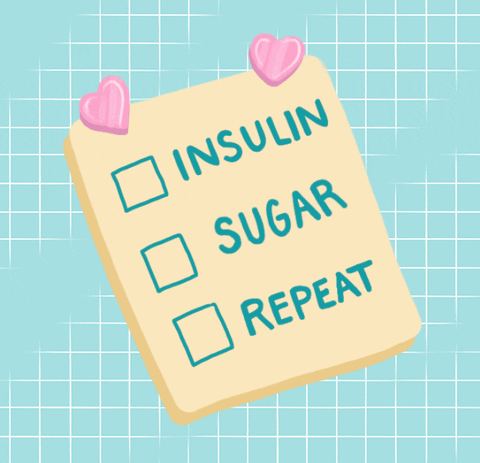 Giphy
GiphyDid you know that in 2024, Black women were diagnosed with diabetes 24 percent more than any other adult demographic. Also, it continues to be a reality that heart disease is the leading cause of death for Black women. These two sobering statistics alone should be enough of an incentive to do whatever you can to keep the risk of diabetes and heart disease way down.
One way to do that is by getting more sleep. Aside from the fact that sleep strengthens your immune system to where it is easier for you to fight off illness and diseases, sleep can keep your blood sugar levels in a healthy space; plus, when it comes to your heart, it gives it, along with your arteries and blood vessels a break.
4. Less Sleep Means Less Time for Your Body to Push “Reset”
 Giphy
GiphyIf you really stopped to consider all that your body goes through during the day (you can read some about that here), you definitely would respect it enough to do your best to thank it by giving it no less than six hours of sleep, each and every night. Sleep is what helps to slow your brain and body down so they are able to “refuel” for the next day. After all, how can your body prevent you from getting sick if your immune system is too worn out to fight ailments off? Exactly.
5. More Sleep Helps You to Fight Off Infections
 Giphy
GiphySpeaking of, in order for your body to fight off infections, there are certain cells and antibodies within you that need to be healthy and strong — one way that they get and stay that way is by you getting a good amount of sleep. For instance, remember when I touched on cytokines earlier? Well, the same way that they help to prevent colds, they also help to prevent infections too. And since sleep lowers your cortisol (stress) levels, rest gives your body the time and space to build up an army that can fight off free radicals and other health-related challenges while you are awake.
6. More Sleep Lowers Bodily Inflammation
 Giphy
GiphyWhenever a health-related issue is mentioned on this platform, inflammation is something that is mentioned quite a bit. Probably the easiest way to explain inflammation is it’s how your body responds/reacts whenever something is happening to your body that shouldn’t be, whether it’s an illness, an injury, a germ or something that you may be allergic to.
If you happen to have chronic inflammation, some symptoms that are associated with that include fatigue, stiff joints, skin rashes, weight gain and moodiness.
The interesting thing about all of this is if you aren’t getting enough rest, you could be triggering inflammation in your body. That’s because studies reveal that a lack of sleep can elevate molecules that are associated with inflammation. So, if you don’t want inflammation to increase within your system, you should definitely catch more zzz’s.
7. More Sleep Regulates Hormones
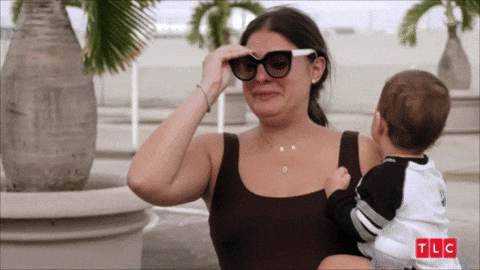 Giphy
GiphyWhen it comes to hormones like serotonin, estrogen and cortisol, believe it or not, they play a role in how your immune system acts and overreacts. That’s because, if your hormones are out of balance, that can cause your immune system to work harder than it actually should and that can make you more vulnerable to sickness. One way to keep your hormones leveled out? SLEEP.
That’s because sleep gives your body the opportunity to rest, repair and restore your hormone levels. On the other hand, when you are sleep deprived, that can put/keep your hormones on the ultimate roller coaster ride. #notgood
8. More Sleep Strengthens Vaccines
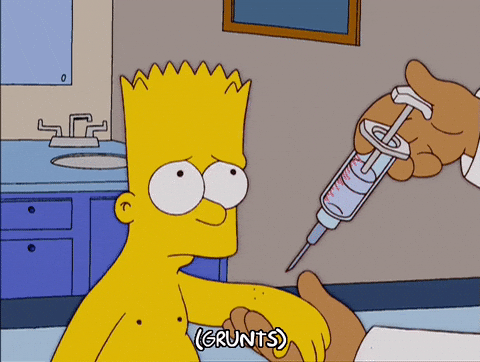 flu shot GIF - Find & Share on GIPHYGiphy
flu shot GIF - Find & Share on GIPHYGiphyIf you’re someone who is good for getting some sort of vaccine around this time of the year, make sure that you rest up before and after getting your shots. Not only does adequate rest before a vaccination help your immune system to be better receptive to your shots but sleep also helps your body to build up enough antibodies to make your vaccinations effective after getting them. Because if you’re gonna get pricked, shouldn’t it be worth it? My thoughts exactly.
Get some freakin’ sleep! Your immune system depends on it.
Let’s make things inbox official! Sign up for the xoNecole newsletter for love, wellness, career, and exclusive content delivered straight to your inbox.
Featured image by Shutterstock



